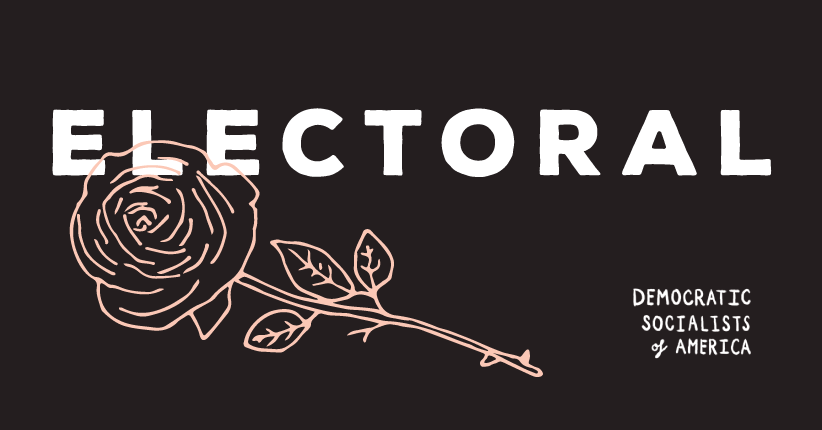Author: Duncan H.
I drafted R3: Acting Like a Party to set out a definition and process for endorsements that suits what DSA is. To me, DSA is something that’s constantly moving and changing. What is certain to me though is that while we may not have the right legal fiction registered under our name (and perhaps it’s better that we don’t), we’re moving in the direction of an independent working class political party.
We have a sovereign, dues-paying membership. We have regular congresses of the membership with freely elected leadership. We have chapters with vibrant local creativity. We even have a burgeoning national electoral project with workshops to boot! I’d say that on the road to a political party, all we’re missing is a political program to center our tactics around — and we’re getting that for the 2024 elections.
But because of this, endorsements mean something different than just plastering a logo on literature or putting out some promotional tweets. Membership-based organizations like DSA are necessarily democratic. They focus their budgets on member-driven projects and consult their membership on what to do. We aren’t an elite team of specialists who can slap a logo onto a campaign with some tech and skilled labor on the side. Ultimately, what we give is our collective labor with the vitality that democratic decision-making and membership driven political initiative bring to the table. No matter what, an endorsement worth seeking from us has always amounted to this.
So what is the issue then with the endorsement categories set out in “The ABC’s for Seattle DSA Candidates?” It assumes that an endorsement which indicates “general support” means less involvement when a DSA endorsement pretty much means that we will be involved! Why else would a candidate or organization seek our endorsement? Labor is what we bring. When our electoral organizers come in with a candidate that is seeking a paper endorsement, the debate has already shifted away from curating DSA representatives as the ABC’s set out. We don’t hold these decisions against the priority that the resolution sets in running DSA representatives.
R3 aims to set a different framing for how candidates’ endorsements are deliberated by membership. Gone is the “general support” endorsement, and arrived is the primacy of DSA representative campaigns. Yet, there is language leaving open the possibility of non-DSA candidates. This is intentional, as we cannot decree that we already have DSA representatives ready to run amongst our ranks. Instead, electoral tactics would be evaluated against the priority set by this resolution in running DSA representatives.
If R3 passes, the framing for such an endorsement would be that if electoral organizers want to pursue the tactic of supporting a non-DSA representative campaign, the onus is now on them to explain in their endorsement proposal how this campaign will build a chapter ready to run DSA representatives. Rather than starting out by stating that we were just looking to support someone out of general broad left affinity, we are starting out by stating that our support is a tactical decision that we can tangibly situate in a roadmap to running DSA representatives in X, Y, and Z ways. The affirmation of this tactic ultimately lies in the hands of our membership.
Seattle DSA is on a trajectory to breaking ground in socialist electoral work. This resolution with its amendment (the latter by myself and Shiloh B.) will help shape our endorsement process into a democratic tool of the membership to wield in building a political party.
On these grounds, I encourage the reader to vote YES on both motions at Chapter Convention.
